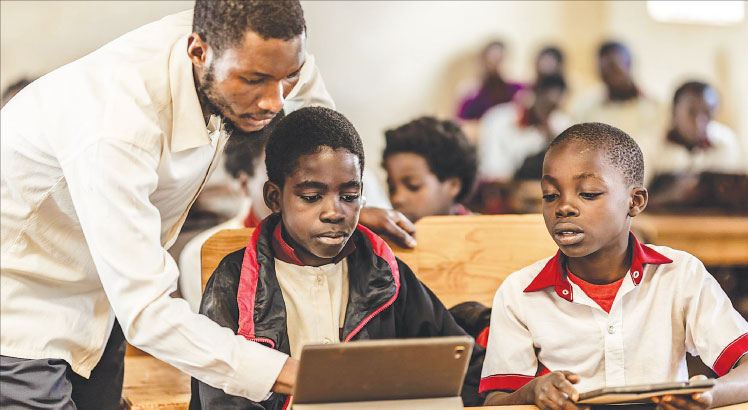Digital tablets improve learning and teaching
Ben-Oni Mwamba is in Standard Six at Umodzi Katubza Primary School at Dzaleka Refugee Camp in Dowa.
For him, school is the perfect escape from daily challenges.
The 13-year-old and his parents fled war in the Democratic Republic of Congo (DRC) six years ago.
However, he is ambivalent about the host country just as he is about the DRC to which he does not want to return.
He would rather be elsewhere, such as the library or the teaching lab, where learners use tablets to search for more information about what they learn.
“The tablets help us learn things we didn’t understand in class. If you search for information on the Internet and are focused, you understand it,” he says.
Once a week, learners from standards Three to Six take turns using tablets in the teaching lab during one of their lessons.
The tablets were provided under the Connect My School project implemented by Unicef Malawi in partnership with Jesuit Refugee Service (JRS) with financial support from Unicef Spain.

Access to digital technologies has helped address learning gaps in the most vulnerable communities, particularly among the children in the refugee community.
In November last year, two primary schools—Umodzi Katubza and Changalu, located two kilometres apart—received a solar energy system, five laptops and 150 tablets to improve their teaching and learning experiences.
Teachers were also trained on how to use the devices.
JRS digital learning officer Mwai Phiri says: “Most schools have few books and learning materials. The tablets and the Internet address that.
“We’re not providing additional learning materials or something outside the curriculum. It’s still the Malawian curriculum. We want teachers to have access to more materials for subjects they are teaching.”
Using tablets in primary schools can enhance the quality of education and provide a more engaging, interactive and personalised learning experience for students, says Changalu headteacher Joseph Bintoni.
His school has 1130 learners and 13 teachers. Bintoni has taught for 16 years and has been a headteacher for 11.
He says: “Previously, teachers would run up and down looking for information when preparing lessons, but they now go on the Internet and search for it.
“It is quick and convenient because they can search for the information in class instead of rushing to consult books in the office. This saves time.”
Bintoni adds that the tablets have enriched the learning experience as the learners are interested to learn more when teachers give instructions.
“They discover more details on their own. If a [history] teacher wants to teach about the pyramids in Egypt, the learners go on the internet and see them quickly on the tablet, instead of having a teacher draw them on the board,” he explains.
Concurring, Emmanuel Mpiana Kanku Alphonse, a teacher at Umodzi Katubza, says the tablets provide learners with access to a vast range of educational content such as e-books, online videos, instructional games and apps.
Connect My School, he says, has simplified teaching even though they experienced teething problems with some children who had no access to similar gadgets at home.
“It wasn’t a problem for some learners who have these gadgets at home, but for others, it was their first time. But they enjoy using them. Sometimes they refuse to leave when you dismiss a class because they still want to use them,” he says.
Due to time constraints as well as limited space and availability of gadgets, the devices are only available to learners in standards Five to Eight at Chagalu, but the school plans to scale them further to the lower classes.
At Umodzi Katubza, however, the school, with 4 600 learners, restricts them to standards Three to Six, but Alphonse wishes they were extended to standards Seven and Eight learners as well.
“It would help Standard Eight learners access materials to prepare for national examinations,” he says.
But Mwayi Kambewa, another teacher at the school, wishes learners in rural areas had access to the gadgets as it would broaden their horizons.
“Most of the time, the learners [in rural schools] are not exposed, so they drop out of school at a certain stage. With the Internet, they would be exposed to information that is just not learned in class,” she says.
For Milicca Saini, a 12-year-old at Changalu Primary School, the tablets have helped her broaden her horizons and solidify her dream of becoming a journalist.
“We use them once a week, but they supplement what we learn in class,” she says.
Meanwhile, Ben-Oni can’t imagine a life without the tablets or the computers at the library.
“It wouldn’t be an excellent idea,” he says.





